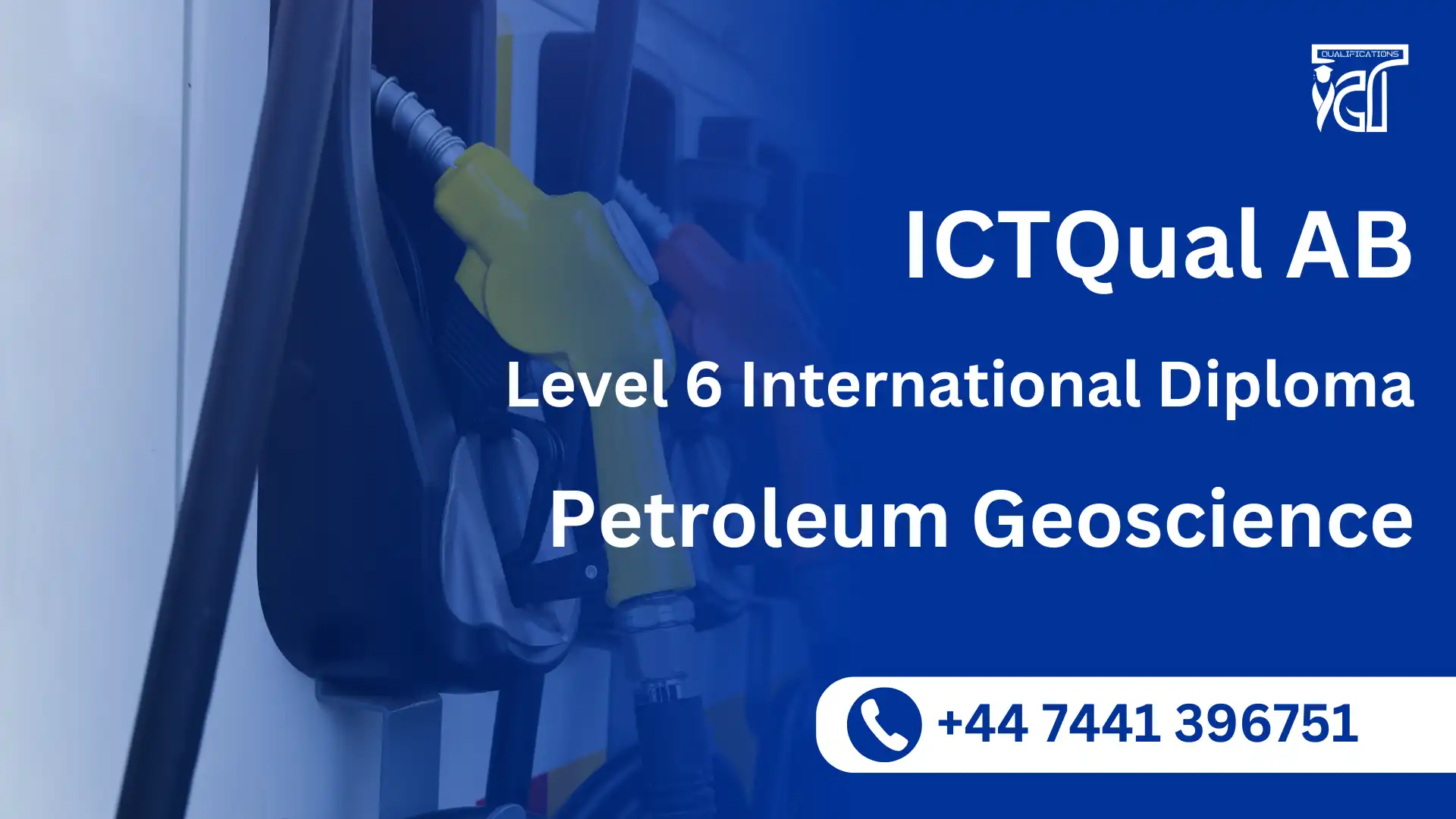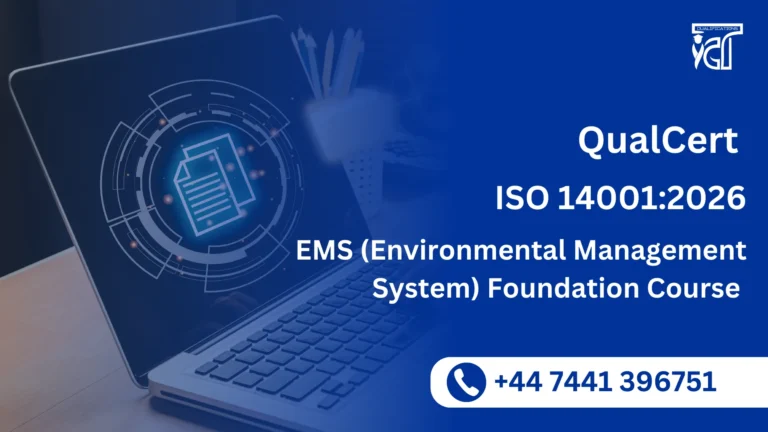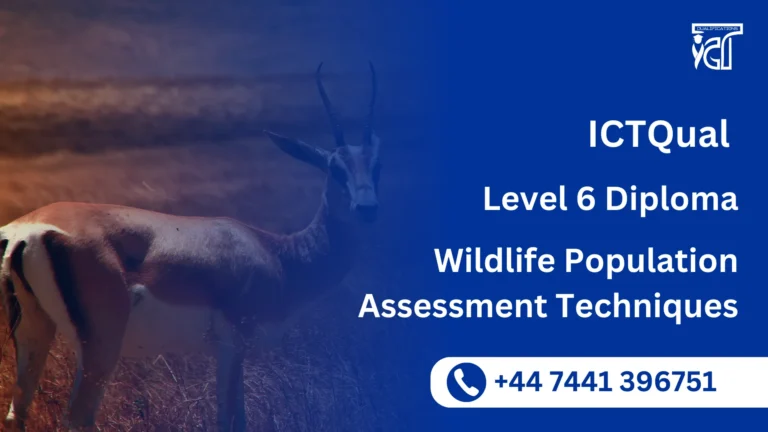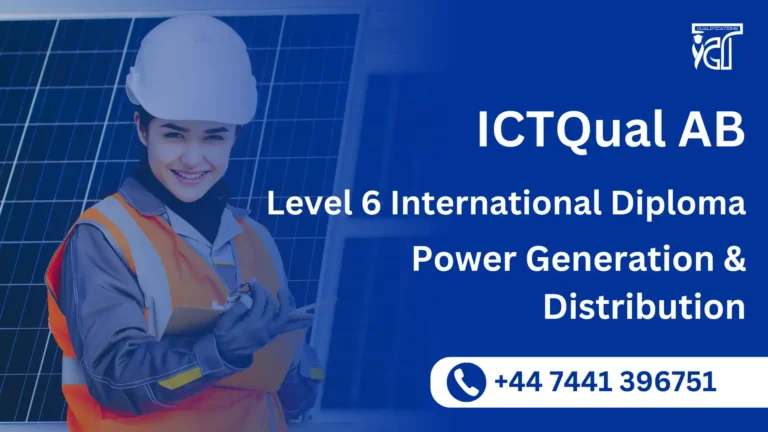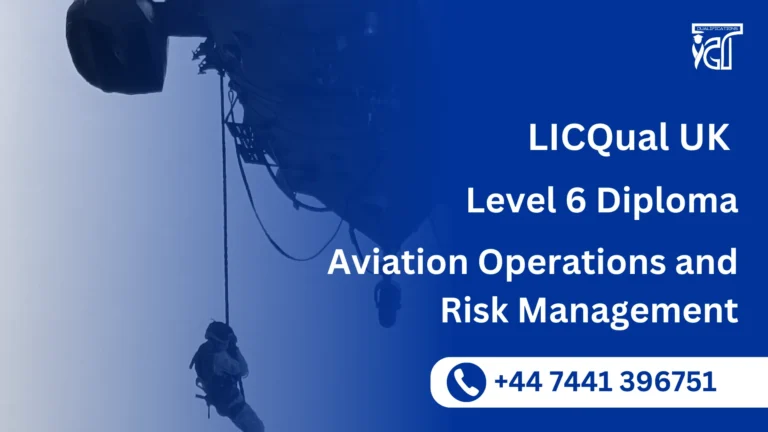The ICTQual AB Level 6 International Diploma in Petroleum Geoscience is a comprehensive, industry-relevant qualification designed to prepare learners for advanced roles in the exploration and production of hydrocarbon resources. This three-year, 360-credit programme equips learners with the specialist knowledge and practical skills needed to analyse geological formations, interpret seismic data, and contribute to efficient petroleum exploration and field development.
Tailored for both fresh learners entering the energy sector and experienced professionals seeking career growth, the diploma bridges the gap between academic learning and practical application. Learners will develop competencies in sedimentology, structural geology, reservoir characterisation, and basin analysis—skills that are highly valued by employers in upstream oil and gas operations worldwide.
Graduates of this programme can progress to rewarding careers as petroleum geoscientists, exploration analysts, reservoir engineers, or project coordinators within exploration firms, energy operators, and oilfield service companies. The qualification also provides a strong foundation for advanced studies or specialist certifications, supporting long-term career development and global mobility.
By completing this internationally recognised diploma, learners gain critical thinking abilities, analytical expertise, and the confidence to make informed decisions in high-stakes petroleum projects. Its structured curriculum and global industry relevance make it an ideal choice for those aiming to excel in petroleum geoscience and make a meaningful contribution to the energy industry’s future.
ICTQual AB Level 6 International Diploma in Petroleum Geoscience
This qualification, the ICTQual AB Level 6 International Diploma in Petroleum Geoscience, consists of 36 mandatory units.
Year 1 – Foundation in Petroleum Geoscience
- Principles of Geology and Earth Sciences
- Introduction to Petroleum Exploration
- Mineralogy and Petrology
- Sedimentology and Stratigraphy
- Geophysical Methods in Exploration
- Introduction to Reservoir Engineering
- Drilling Operations Fundamentals
- Petroleum Fluid Properties
- Geoscience Data Collection Techniques
- Health, Safety, and Environmental Awareness
- Scientific Report Writing
- Introduction to Geospatial Technology
Year 2 – Intermediate Petroleum Geoscience
- Structural Geology and Tectonics
- Advanced Sedimentary Basin Analysis
- Reservoir Characterisation and Modelling
- Petrophysics and Well Logging
- Seismic Interpretation and Geophysics
- Drilling Fluid and Wellbore Stability
- Production Systems and Flow Mechanics
- Hydrocarbon Exploration Techniques
- Risk Assessment and Project Management
- Environmental Impact and Sustainability
- GIS Applications in Petroleum Geoscience
- Technical Communication and Data Analysis
Year 3 – Advanced Petroleum Geoscience
- Advanced Reservoir Simulation
- Enhanced Oil Recovery Techniques
- Petroleum Economics and Project Evaluation
- Exploration Strategy and Field Development
- Advanced Geophysics and Seismic Modelling
- Subsurface Fluid Flow and Reservoir Dynamics
- Drilling Design and Well Planning
- Petroleum Laboratory Techniques
- Energy Transition and Sustainable Practices
- Research Methods in Geoscience
- Capstone Project in Petroleum Geoscience
- Professional Development and Leadership in Energy
Learning Outcomes for the ICTQual AB Level 6 International Diploma in Petroleum Geoscience:
Year 1 – Foundation in Petroleum Geoscience
Principles of Geology and Earth Sciences
- Understand the basic principles of geology and Earth sciences.
- Explain rock formation processes, plate tectonics, and geological cycles.
- Apply foundational knowledge to identify geological structures and formations.
Introduction to Petroleum Exploration
- Comprehend the petroleum exploration process from discovery to production.
- Identify key geological and geophysical indicators for hydrocarbon presence.
- Recognise the roles of exploration teams and industry practices.
Mineralogy and Petrology
- Analyse mineral compositions and rock textures.
- Classify igneous, sedimentary, and metamorphic rocks.
- Apply mineralogical knowledge to petroleum geology contexts.
Sedimentology and Stratigraphy
- Understand sedimentary processes and depositional environments.
- Interpret stratigraphic sequences and basin evolution.
- Apply stratigraphic principles to hydrocarbon exploration.
Geophysical Methods in Exploration
- Describe geophysical techniques used in petroleum exploration.
- Interpret basic seismic, magnetic, and gravity data.
- Understand the limitations and advantages of different methods.
Introduction to Reservoir Engineering
- Explain fundamental reservoir concepts and properties.
- Understand fluid flow in porous media.
- Identify reservoir types and their characteristics.
Drilling Operations Fundamentals
- Describe drilling rig components and operations.
- Understand drilling techniques and wellbore construction.
- Recognise operational safety and regulatory considerations.
Petroleum Fluid Properties
- Analyse the physical and chemical properties of hydrocarbons.
- Understand phase behaviour and fluid classification.
- Apply knowledge to reservoir and production contexts.
Geoscience Data Collection Techniques
- Understand methods for field and laboratory data collection.
- Interpret geological, geophysical, and petrophysical datasets.
- Apply data collection best practices in exploration projects.
Health, Safety, and Environmental Awareness
- Recognise health and safety hazards in petroleum operations.
- Understand environmental protection practices and compliance requirements.
- Promote safe and sustainable operational culture.
Scientific Report Writing
- Develop skills for preparing clear and concise scientific reports.
- Communicate technical findings effectively to stakeholders.
- Apply proper referencing, structure, and presentation standards.
Introduction to Geospatial Technology
- Understand GIS principles and applications in petroleum geoscience.
- Analyse spatial data for exploration and reservoir management.
- Apply geospatial tools to real-world scenarios.
Year 2 – Intermediate Petroleum Geoscience
Structural Geology and Tectonics
- Interpret geological structures and tectonic settings.
- Analyse deformation patterns affecting reservoirs.
- Apply structural concepts to exploration and production planning.
Advanced Sedimentary Basin Analysis
- Assess basin formation and evolution.
- Interpret sedimentary facies and reservoir potential.
- Apply basin analysis for hydrocarbon prospect evaluation.
Reservoir Characterisation and Modelling
- Construct detailed reservoir models using geological and petrophysical data.
- Evaluate reservoir heterogeneity and performance.
- Apply modelling techniques for production optimisation.
Petrophysics and Well Logging
- Understand petrophysical properties and measurement techniques.
- Interpret well logs to evaluate reservoir quality.
- Integrate petrophysical data into exploration and production decisions.
Seismic Interpretation and Geophysics
- Analyse seismic data for structural and stratigraphic interpretation.
- Identify hydrocarbon traps and potential drilling targets.
- Apply geophysical methods in exploration projects.
Drilling Fluid and Wellbore Stability
- Understand drilling fluid types and their functions.
- Analyse wellbore stability challenges and mitigation methods.
- Apply fluid management strategies to drilling operations.
Production Systems and Flow Mechanics
- Comprehend reservoir-to-surface production systems.
- Analyse fluid flow behaviour in wells and pipelines.
- Apply production optimisation techniques.
Hydrocarbon Exploration Techniques
- Evaluate exploration methodologies and workflows.
- Identify potential hydrocarbon accumulations.
- Apply exploration planning and risk assessment.
Risk Assessment and Project Management
- Understand risk identification, analysis, and mitigation in projects.
- Apply project management principles to petroleum operations.
- Integrate technical and financial considerations in planning.
Environmental Impact and Sustainability
- Assess environmental impacts of exploration and production.
- Understand sustainable practices and regulatory compliance.
- Implement environmental management strategies.
GIS Applications in Petroleum Geoscience
- Analyse geospatial datasets for reservoir and exploration studies.
- Apply GIS tools for mapping and spatial analysis.
- Integrate GIS into decision-making processes.
Technical Communication and Data Analysis
- Develop advanced data analysis skills for petroleum geoscience.
- Present technical information effectively to diverse audiences.
- Apply statistical and computational tools to geoscience datasets.
Year 3 – Advanced Petroleum Geoscience
Advanced Reservoir Simulation
- Conduct dynamic reservoir simulations for production forecasting.
- Analyse reservoir performance under various development scenarios.
- Apply simulation results to optimise recovery strategies.
Enhanced Oil Recovery Techniques
- Understand EOR methods and principles.
- Evaluate the applicability of thermal, chemical, and gas injection techniques.
- Integrate EOR strategies into reservoir management plans.
Petroleum Economics and Project Evaluation
- Assess financial viability of petroleum projects.
- Apply cost-benefit analysis, NPV, and IRR calculations.
- Integrate economic factors into exploration and production decisions.
Exploration Strategy and Field Development
- Design exploration campaigns and field development plans.
- Evaluate technical, economic, and operational feasibility.
- Apply strategic thinking for optimal resource extraction.
Advanced Geophysics and Seismic Modelling
- Apply advanced geophysical modelling techniques.
- Interpret complex seismic datasets for exploration insights.
- Integrate geophysical data into reservoir evaluation.
Subsurface Fluid Flow and Reservoir Dynamics
- Analyse multiphase fluid flow in reservoirs.
- Evaluate pressure, saturation, and reservoir connectivity.
- Apply principles to production optimisation and reservoir management.
Drilling Design and Well Planning
- Design wells considering geological and operational constraints.
- Plan drilling programmes and assess associated risks.
- Apply wellbore design principles to maximise safety and efficiency.
Petroleum Laboratory Techniques
- Conduct laboratory analysis of rock and fluid samples.
- Interpret experimental results for reservoir characterisation.
- Apply laboratory techniques to support field operations.
Energy Transition and Sustainable Practices
- Understand energy transition trends and alternative resources.
- Apply sustainability principles to petroleum operations.
- Develop strategies for reducing environmental impact.
Research Methods in Geoscience
- Apply scientific research methodologies to geoscience projects.
- Conduct literature reviews, data collection, and analysis.
- Present research findings effectively to technical and non-technical audiences.
Capstone Project in Petroleum Geoscience
- Integrate knowledge from previous units to complete a comprehensive project.
- Analyse real-world challenges and propose evidence-based solutions.
- Demonstrate problem-solving, critical thinking, and professional skills.
Professional Development and Leadership in Energy
- Develop leadership and management skills in petroleum and energy sectors.
- Enhance communication, teamwork, and decision-making abilities.
- Prepare for professional career advancement and industry engagement.
The ICTQual AB Level 6 International Diploma in Petroleum Geoscience provides learners with advanced knowledge, practical skills, and globally relevant expertise to excel in the petroleum exploration and production sector. This three-year, 360-credit programme offers significant professional value, opening pathways to diverse career opportunities, higher-level studies, and long-term success in the global energy industry.
Industry-Relevant Knowledge and Skills
- Develop in-depth expertise in geological interpretation, seismic data analysis, and reservoir characterisation.
- Gain practical understanding of sedimentology, structural geology, and basin analysis for petroleum exploration.
- Build analytical, critical thinking, and problem-solving skills for complex geoscience challenges.
- Learn to apply cutting-edge technologies and methods used in modern petroleum geoscience.
- Acquire competencies aligned with international oil and gas standards.
Enhanced Career Opportunities
- Qualify for roles such as Petroleum Geoscientist, Exploration Analyst, Reservoir Engineer, or Energy Project Coordinator.
- Increase employability within global energy companies, oilfield service providers, and exploration firms.
- Access opportunities in both onshore and offshore petroleum projects worldwide.
- Strengthen your profile for leadership and specialised technical positions.
- Build a career path adaptable to emerging energy and resource management sectors.
Professional Development and Recognition
- Earn a respected Level 6 diploma demonstrating advanced technical proficiency.
- Strengthen transferable skills in decision-making, project planning, and teamwork.
- Gain recognition for expertise that aligns with the expectations of international employers.
- Prepare for progression to Level 7 Diplomas or Master’s programmes in petroleum or energy-related fields.
- Establish a foundation for lifelong learning and career advancement.
Flexible and Future-Focused Learning
- Three-year, 360-credit structure ensures a balance of theory and practical application.
- Adaptable for both fresh learners and experienced professionals seeking growth.
- Equips learners to meet evolving energy industry trends and sustainability goals.
- Supports global mobility and career flexibility across diverse geoscience roles.
- Prepares learners for future innovations in petroleum and energy exploration.
The ICTQual AB Level 6 International Diploma in Petroleum Geoscience is tailored for learners who are motivated to excel in petroleum exploration and geoscience. It is suitable for both fresh entrants eager to build a strong foundation in the energy sector and experienced professionals seeking to enhance their expertise and progress to advanced roles within the global oil and gas industry.
Fresh Entrants to the Energy Sector
- Learners aiming to start a career in petroleum geoscience or hydrocarbon exploration.
- Recent graduates seeking a recognised qualification to gain a competitive edge.
- Individuals motivated to develop practical and analytical skills in geological interpretation.
- Fresh candidates looking for a career with international mobility and growth potential.
- Those passionate about energy resources and geoscience innovation.
Experienced Oil & Gas Professionals
- Geoscientists, drilling engineers, or exploration analysts aiming for senior positions.
- Professionals seeking to formalise and update their knowledge in petroleum geoscience.
- Learners looking to expand their expertise in reservoir evaluation and basin analysis.
- Those pursuing leadership, consultancy, or project coordination roles in exploration and production.
- Energy sector workers who want to strengthen their credentials for international opportunities.
Career Changers and Industry Aspirants
- Professionals from geology, environmental science, or related technical fields exploring a transition to petroleum geoscience.
- Individuals seeking a structured pathway to enter the oil and gas industry.
- Learners aiming to diversify their technical skill set and future career options.
- Candidates looking for a recognised qualification to facilitate global career opportunities.
- Those interested in contributing to the future of energy exploration and resource management.
Completing the ICTQual AB Level 6 International Diploma in Petroleum Geoscience opens doors to advanced studies and specialised professional opportunities within the global energy sector. Learners will be well-prepared to progress academically or professionally, building on their geoscience expertise to achieve long-term career growth.
Academic Progression
- Advance to Level 7 Diplomas in Oil & Gas Engineering, Petroleum Management, or related disciplines.
- Enrol in Master’s programmes such as Petroleum Engineering, Geoscience, or Energy Management.
- Pursue specialist certifications in advanced well control, offshore safety, or petroleum data interpretation.
- Access pathways to research opportunities in energy resources and applied geoscience.
- Strengthen your foundation for further qualifications in energy and resource management.
Career Progression
- Qualify for senior positions such as Petroleum Geoscientist, Exploration Manager, or Reservoir Specialist.
- Enhance eligibility for roles within international oil companies, energy operators, and exploration firms.
- Progress into leadership or consultancy roles in upstream exploration and production.
- Build expertise for positions in emerging energy sectors and sustainable resource management.
- Improve career mobility across global oil and gas markets and related industries.
As an approved centre of ICTQual AB, we offer two distinct certification routes for the ICTQual AB Level 6 International Diploma in Petroleum Geoscience, ensuring accessibility for both experienced professionals and new learners:
Route One – Experienced Professionals
- Designed for learners with a minimum of six years of verifiable industry experience in petroleum geoscience, oil and gas, or related fields.
- This route recognises prior learning and expertise, allowing experienced professionals to achieve the diploma efficiently.
Route Two – Fresh Candidates
- Intended for fresh learners or those without significant industry experience.
- Learners are required to complete 36 structured assignments covering all core units of the qualification.
- This route ensures a comprehensive understanding of petroleum geoscience concepts, practical skills, and industry-relevant knowledge.
Enrol today with us, an authorised ICTQual AB centre, to pursue the route that aligns with your background and career goals. Both pathways lead to the same internationally recognised qualification, preparing you for advanced opportunities in the global energy sector.
Entry Requirements
To enrol in the ICTQual AB Level 6 International Diploma in Petroleum Geoscience, learners must meet the following criteria to ensure they are prepared for the academic and practical demands of the programme:
Minimum Age
- Learners must be at least 18 years old at the time of enrolment.
Educational Background
- A Level 5 Diploma or an equivalent qualification in a relevant field (e.g., geology, geoscience, or engineering) is preferred.
- Alternatively, completion of secondary education with strong performance in science-related subjects may be accepted for fresh candidates.
Industry Experience
- Route One: A minimum of six years of verifiable work experience in petroleum geoscience, oil and gas, or related industries.
- Route Two: Fresh candidates without experience must complete 36 structured assignments as part of the programme.
Language Proficiency
- Learners should demonstrate proficiency in English to fully engage with course materials and assessments.
- Evidence of prior study in English or recognised language test results may be requested for non-native speakers.
These entry requirements ensure all learners—whether experienced professionals or newcomers—are equipped to succeed and gain maximum benefit from this internationally recognised qualification.
Register Now
Qualification Process
Qualification Process for the ICTQual AB Level 6 International Diploma in Petroleum Geoscience
- Self-Assessment:
Begin by evaluating your eligibility to ensure you meet the qualification requirements, including work experience, knowledge, and language proficiency. - Registration:
Complete your registration by submitting the required documents, including a scanned copy of a valid ID, and paying the registration fee. - Induction:
An assessor will conduct an induction to confirm your eligibility for the course and explain the evidence requirements. If you do not meet the criteria, your registration will be cancelled, and the fee will be refunded. - Assignments & Evidence Submission:
Provide all assignments and the necessary evidence based on the assessment criteria outlined in the course. If you are unsure of the required evidence, consult with the assessor for guidance on the type and nature of evidence needed. - Feedback and Revision:
The assessor will review your submitted evidence and provide feedback. Evidence that meets the criteria will be marked as “Criteria Met,” while any gaps will be identified. You will be asked to revise and resubmit if needed. - Competence Evidence:
Submit final evidence demonstrating that all learning outcomes have been met. This evidence will be marked as “Criteria Met” by the assessor once it is satisfactory. - Internal Quality Assurance (IQA):
The Internal Quality Assurance Verifier (IQA) will review your evidence to ensure consistency, quality, and compliance with standards. - External Verification:
The IQA will submit your portfolio to ICTQUAL AB External Quality Assurance Verifiers (EQA) for final confirmation. The EQA may contact you directly to verify the authenticity of your evidence. - Certification:
Upon successful completion of all checks, ICTQUAL AB will issue your official certificate, confirming that you have attained the ICTQual AB Level 6 International Diploma in Petroleum Geoscience.

